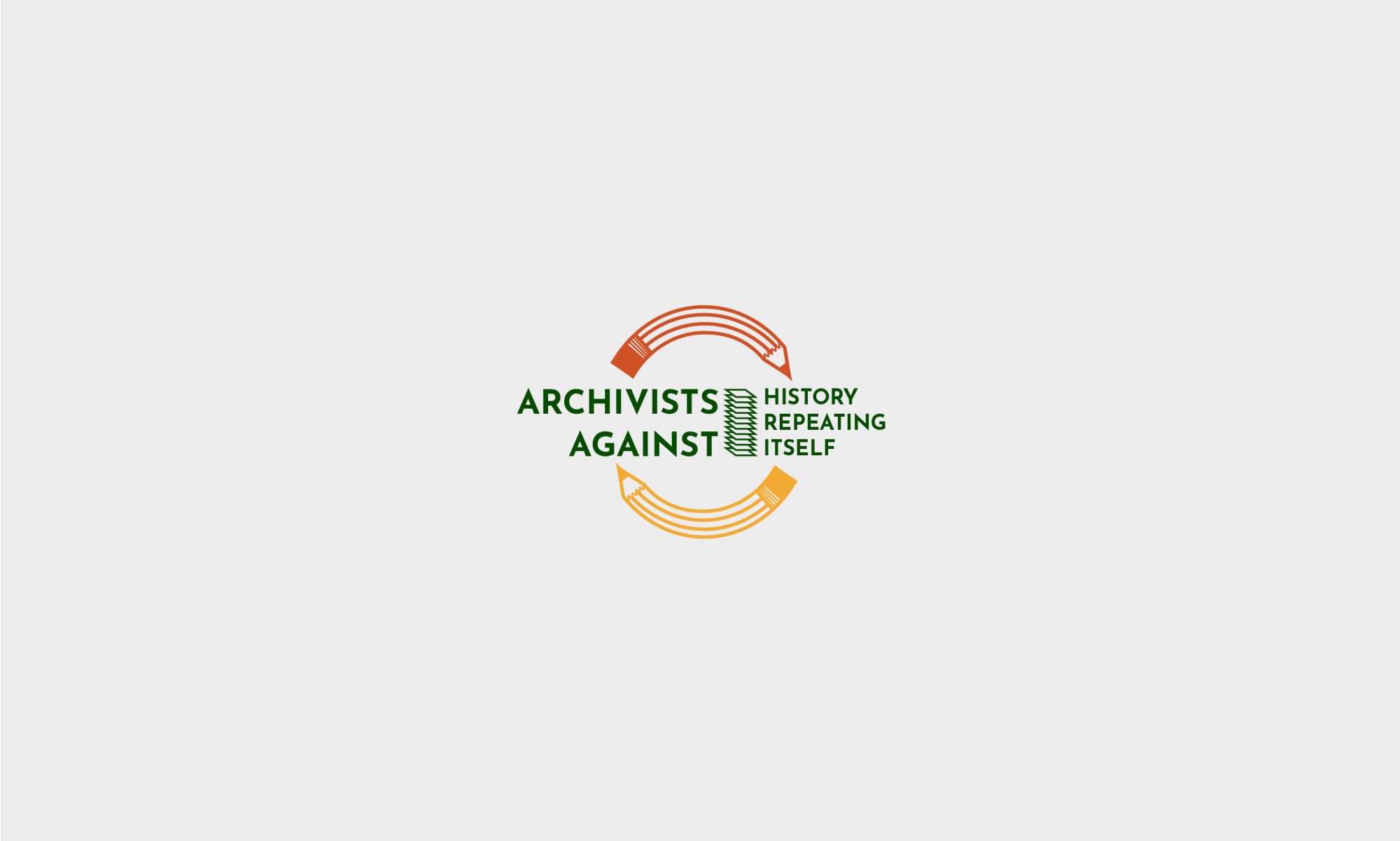RECOMENDED READINGS
An incomplete list in alphabetical order of author’s last name by each category.
Got a reading about liberatory archives you want us to include?
 Email us at archivistsagainst at gmail.com
Email us at archivistsagainst at gmail.com 
Michelle Caswell and Marika Cifor, “From Human Rights to Feminist Ethics: Radical Empathy in Archives,” Archivaria 81 (Spring 2016): 23-43.
Michelle Caswell, “Inventing New Archival Imaginaries: Theoretical Foundations for Identity-Based Community Archives,” in Identity Palimpsests: Ethnic Archiving in the U.S. and Canada (Sacramento, CA: Litwin Books, 2014), 35-55.
Jarrett Drake, “Liberatory Archives: Towards Belonging and Believing,” Medium, https://medium.com/on-archivy/liberatory-archives-towards-belonging-and-believing-part-1-d26aaeb0edd1 and https://medium.com/on-archivy/liberatory-archives-towards-belonging-and-believing-part-2-6f56c754eb17
Anne J. Gilliland and Sue McKemmish, “The Role of Participatory Archives in Furthering Human Rights, Reconciliation and Recovery,” Atlanti: Review for Modern Archival Theory and Practice 24 (2014): 84-85.
Verne Harris, “Memory for Justice: A Nelson Mandela Foundation Provocation,” (2014), https://www.nelsonmandela.org/uploads/files/MEMORY_FOR_JUSTICE_2014v2.pdf.
Verne Harris, “Ethics and the Archive: An Incessant Movement of Recontextualization.” In Controlling the Past: Documenting Society and Institutions (Chicago: Society of American Archivists, 2011), 345-362.
Verne Harris, “Archives Politics, and Justice,” In: Political Pressure and the Archival Record, Margaret Procter et al, eds. (Chicago: Society of American Archivists, 2005).
Verne Harris, Archives and Justice: A South African Perspective (Chicago: Society of American Archivists, 2007).
Lae’l Hughes-Watkins, “Moving Toward a Reparative Archive: A Roadmap for a Holistic Approach to Disrupting Homogenous Histories in Academic Repositories and Creating Inclusive Spaces for Marginalized Voices,” Journal of Contemporary Archival Studies 5 (2018): https://elischolar.library.yale.edu/jcas/vol5/iss1/6/
Ricardo Punzalan and Michelle Caswell, “Critical Directions for Archival Approaches to Social Justice,” Library Quarterly 86 (1) (2016): 25-42.
Doria Johnson, Jarrett Drake, and Michelle Caswell, “From Cape Town to Chicago to Colombo and Back Again: Towards a Liberation Theology for Memory Work,” Nelson Mandela Foundation, February 27, 2017, https://www.nelsonmandela.org/news/entry/reflections-from-the-2016-mandela-dialogues.
Thanwadee Sookprasert et al., “Ethics, Access, and Rights in Anthropological Archive Management: A Case Study from Thailand,” International Journal of Humanities and Arts Computing 7 (2013) Supplement: 100–110.
David Wallace, “Locating Agency: Interdisciplinary Perspectives on Professional Ethics and Archival Morality,” Journal of Information Ethics 19:1 (Spring 2010): 172-189.
Howard Zinn, “Secrecy, Archives and the Public Interest,” Midwestern Archivist 2 (1977): 14-26
Michelle Caswell (with graphic design by Gracen Brilmyer), “Teaching to Dismantle White Supremacy in the Archives Classroom,” Library Quarterly 87(3) (2017), special issue “Aftermath: Libraries and the U.S. Election”: 222-235.
The Diversity Working Group (Renee Saucier, Stefanie Martin, Moska Rokay, and Tomoko Shida). (2019). Dismantling White Supremacy in GLAMs and GLAM Education [Galleries, Libraries, Archives, Museums]. The IJournal: Graduate Student Journal of the Faculty of Information, 4(3), 11-20. https://doi.org/10.33137/ijournal.v4i3.33075 https://theijournal.ca/index.php/ijournal/article/view/33075
Anthony Dunbar, “Introducing critical race theory to archival discourse: Getting the conversation started,” Archival Science 6 (2006), 109-129.
April Hathcock, “White Librarianship in Blackface: Diversity Initiatives in LIS,” October 2015, http://www.inthelibrarywiththeleadpipe.org/2015/lis-diversity/.
David James Hudson, “On ‘Diversity’ As Anti-Racism in LIS: A Critique,” Journal of Critical Library and Information Studies 1 (2017), http://libraryjuicepress.com/journals/index.php/jclis/article/view/6.
Mario Ramirez, “Being Assumed Not to Be: A Critique of Whiteness as an Archival Imperative,” The American Archivist 78 (2015): 339-356
Tonia Sutherland, “Archival Amnesty: In Search of Black American Transitional and Restorative Justice,” Journal of Critical Library and Information Studies (2017): http://libraryjuicepress.com/journals/index.php/jclis/article/view/42/27.
Stacie Williams and Jarrett Drake, “Power to the People: Documenting Police Violence in Cleveland,” Journal of Critical Library and Information Studies (2017): http://libraryjuicepress.com/journals/index.php/jclis/article/view/33.
Nicole Cooke, Miriam Sweeney, and Safiya Umoja Noble, “Social Justice as Topic and Tool; An Attempt to Transform an LIS Curriculum and Culture,” Library Quarterly 86:1 (2016): 107-124.
Anne Gilliland, “Neutrality, Social Justice, and the Obligations of Archival Education and Educators in the Twenty-first Century,” Archival Science 11 (2011): 193-209.
Pluralizing the Archival Curriculum Group, Archival Education and Research Institute, “Educating for the Archival Multiverse,” American Archivist 74 (Spring/Summer 2011): 69-101.
Sarah T. Roberts and Safiya Umoja Noble, “Empowered to Name, Inspired to Act: Social Responsibility and Diversity as Calls to Action in the LIS Context,” Library Trends 64:3 (2016): 512-532.
Michelle Caswell, Alda Allina Migoni, Noah Geraci and Marika Cifor, “’To Be Able to Imagine Otherwise’: Community Archives and the Importance of Representation.” Archives and Records 38(1) (2016) (special issue on public history): 1-20.
Michelle Caswell, Marika Cifor, and Mario H. Ramirez, “’To Suddenly Discover Yourself Existing’: Uncovering the Affective Impact of Community Archives.” The American Archivist 79 (Spring/ Summer 2016): 56-81.
Bergis Jules, “Confronting Our Failure of Care Around the Legacies of Marginalized People in the Archives” Medium, https://medium.com/on-archivy/confronting-our-failure-of-care-around-the-legacies-of-marginalized-people-in-the-archives-dc4180397280
Kim Christen, “Opening Archives: Respectful Repatriation,” American Archivist 74 (1) (2011): 185–210.
Marisa Duarte and Miranda Belarde-Lewis, “Imagining: Creating Spaces for Indigenous Ontologies,” Cataloging and Classification Quarterly 53 (2015): 677-702.
J.J. Ghaddar, “The Spectre in the Archive: Truth, Reconciliation and Indigenous Archival Memory,” Archivaria 82 (Fall 2016): 3-26
Achille Mbembe, “Decolonizing Knowledge and the Question of the Archive.” Lecture given at Wits Institute for Social and Economic Research (WISER), University of Witwatersrand, (Johannesburg), 2015.
Linda Tuhiwai Smith, Eve Tuck, K. Wayne Yang, Indigenous and Decolonizing Studies in Education: Mapping the Long View (New York: Routledge, http://Linda Tuhiwai Smith, Eve Tuck, K. Wayne Yang, Indigenous and Decolonizing Studies in Education: Mapping the Long View (New York: Routledge, 2019.
Tonia Sutherland, “Reading Gesture: Katherine Dunham, the Dunham Technique, and the Vocabulary of Dance as Decolonizing Archival Praxis,” Archival Science 19 (2019).
Indigenous Knowledge Organization: Special Issue of Cataloging & Classification Quarterly 53 (2015), issue 5-6, https://www.tandfonline.com/toc/wccq20/53/5-6?nav=tocList
Decolonization: Special Issue of Archival Science 19:2 (2019).
Marika Cifor and Stacy Wood, “Critical Feminism in the Archives,” Journal of Critical Library and Information Studies (2017): http://libraryjuicepress.com/journals/index.php/jclis/article/view/27
Jamie Ann Lee, “A Queer/ed Archival Methodology: Archival Bodies as Nomadic Subjects,” Journal of Critical Library and Information Studies (2017): http://libraryjuicepress.com/journals/index.php/jclis/article/view/26.
Maria Elena Martinez, “Archives, Bodies and Imagination: The Case of Juana Aguilar and Queer Approaches to History, Sexuality, and Politics,” Radical History Review 120 (Fall 2014): 159-182.
Gracen Brilmyer, “Archival Assemblages: Applying Disability Studies’ Political/Relational Model to Archival Description.” Archival Science, April 2, 2018, 1–24. https://doi.org/10.1007/s10502-018-9287-6.
